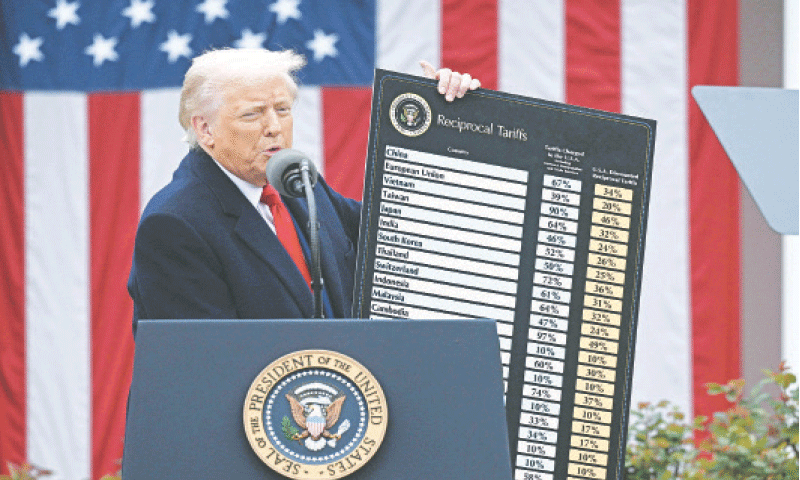• Fitch says tariffs are highest in a century; smaller countries hit with bigger rates
• Islamabad slapped with 29pc ‘reciprocal tariff’ against estimates of 58pc charged to US
• Non-tariff barriers, use of SROs and internet shutdowns cited to justify tariff for Pakistan
WASHINGTON: President Donald Trump’s sweeping tariffs on US imports sparked threats of retaliation on Thursday, as companies and governments rushed to count the costs from an escalating trade war that threatens to shake up global alliances.
The announced penalties unleashed turbulence across world markets and drew condemnation from other leaders facing the end of an era of trade liberalisation that has shaped the global order for decades.
According to Fitch Ratings, the new US tariffs are the highest in more than a century. Imports to the world’s largest consumer market now face an average duty of 22.5pc, up from 2.5pc last year.
Trump said he would impose a 10pc baseline tariff on all imports to the United States and higher targeted duties on some of the country’s biggest trading partners, hammering goods from Italian coffee and Japanese whisky to sportswear made in Asia. The president claims the “reciprocal” tariffs are a response to barriers put on US goods.
Economists said the tariffs could reignite inflation, raise the risk of a US recession and boost costs for the average US family by thousands of dollars — a potential liability for Trump who campaigned on a promise to bring down the cost of living.
Some of the highest increases fell on impoverished countries in Africa, but Canada and Mexico — which have free trade agreements with Washington — escaped the imposition of reciprocal tariffs.
But Madagascar — one of the poorest nations in the world with gross domestic product (GDP) per head of just over $500 —meanwhile faces a 47pc tariff on the modest $733 million of exports of vanilla, metals and apparel that it did with the US last year.
The bluntness of the formula as applied to economies which cannot afford to import much from the US inevitably leads to a high reciprocal tally: 50pc for Lesotho in Southern Africa, 49pc for Cambodia in Southeast Asia.
But the formula is also sowing confusion among rich countries. For the European Union (EU) it has produced a punitive tariff of 20pc — four times the 5pc which the World Trade Organization (WTO) calculates as the EU’s average tariff rate.
Case against Pakistan
According to figures released by the White House, Pakistan is being hit with a 29pc reciprocal tariff. This is apparently a response to the 58pc tariffs charged to the US, which also include “currency manipulation and trade barriers”.
Officials from the Ministry of Commerce told Dawn that they were still evaluating the impact of the tariffs increase on Pakistan’s exports, as the US is the leading export market for Pakistani textile products.
According to the National Trade Estimate Report on Foreign Trade Barriers, released by the office of the US Trade Representative, Washington believes that despite the reduction of applied tariff rates since 2013, US companies have cited concerns that Pakistan has been imposing high tariff rates and, in some cases, additional duties, on products such as automobiles and finished goods.
In addition, Pakistan grants sector- and product-specific import duty exemptions, concessions, and protections through the promulgation of statutory regulatory orders (SROs), which can be issued without stakeholder consultation or providing importers time to ensure compliance.
Under non-tariff barriers, the USTR says the country permits the importation of certain goods only by the public sector or industrial consumers, but some imports require approvals from federal-level ministries.
In addition, the USTR notes, food and consumer product exporters have expressed concerns regarding a lack of uniformity in customs valuation in Pakistan that negatively affects American stakeholders.
Although Pakistan has made gradual improvements toward better coordinating its intellectual property (IP) enforcement efforts and updating its IP laws, serious concerns remain, particularly in the area of enforcement, the document notes.
It also takes issue with measures such as moves by the government to promote data localisation, as well as the routine practice of blocking access to Internet services, mobile data, and social media platforms.
“Although Pakistani law allows repatriation of profits, US and other companies continue to face bureaucratic hurdles repatriating profits, dividends, and royalties from Pakistan, generally coinciding with the government’s focus on stemming outflows of US dollars,” it notes.
“Local franchises of US brands report limitations and extended delays in remitting funds to the United States as a result of SBP policies,” it says.
It also maintains that contract enforcement can be difficult for US and other foreign investors in Pakistan due to significant delays and lack of enforcement of court rulings.
USTR also notes that Pakistan has one of the lowest tax compliance and tax-to-GDP ratios in the world — 9pc in FY2024.
“Pakistan relies heavily on multinational corporations for the revenue generated by tax collection. Foreign investors in Pakistan regularly report that both federal and provincial tax regulations are difficult to navigate, frequently citing the lack of transparency in the assessment of taxes,” it says.
The document also mentions corruption and a weak judicial system as substantial disincentives to foreign investment. While it mentions the National Accountability Bureau, it notes that “business and civil society stakeholders have expressed reservations about the body’s effectiveness and perceived politicisation”.
Businesses sound alarm
Businesses around the globe also faced up to a future of higher prices, trade turmoil and reduced access to the world’s largest market after Trump confirmed their worst fears.
WTO chief Ngozi Okonjo-Iweala warned the measures would “have substantial implications for global trade and economic growth prospects”.
“It clearly isn’t good news for (the) global economy, stability and trade,” Maersk, the world’s second-largest container shipping firm, said in a statement.
With input from AFP and Reuters
Published in Dawn, April 4th, 2025


